Words
word的各种短语
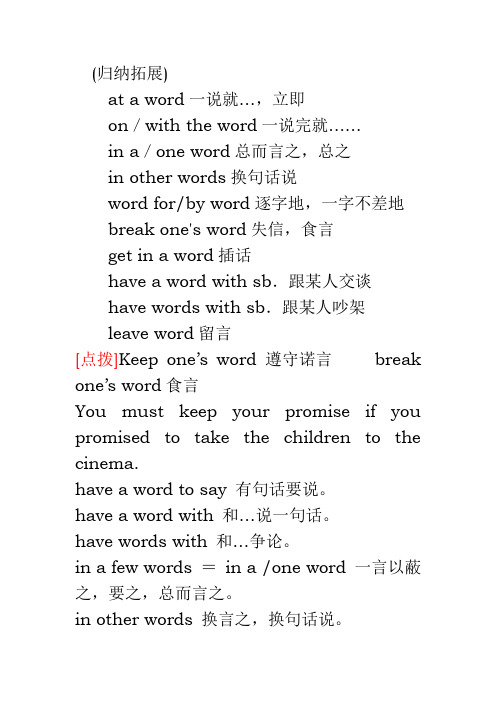
(归纳拓展)at a word一说就…,立即on/with the word一说完就……in a/one word总而言之,总之in other words换句话说word for/by word逐字地,一字不差地break one's word失信,食言get in a word插话have a word with sb.跟某人交谈have words with sb.跟某人吵架leave word留言[点拨]Keep one’s word遵守诺言break one’s word食言You must keep your promise if you promised to take the children to the cinema.have a word to say 有句话要说。
have a word with 和…说一句话。
have words with 和…争论。
in a few words =in a /one word 一言以蔽之,要之,总而言之。
in other words 换言之,换句话说。
word for word 逐字地;一字不变地 ...(特别提示)word作“话语”讲时,是可数名词,当“消息”讲时,不加冠词,不用复数。
(活学巧用)For a long time they walked without saying _________word.Jim was the first to break _________silence.A.the; a B.a;the C.a;/D.the;/keep one's word守信用,履行诺言其反义词是break one’s word, 即“失信”。
I don't think he is a man who keeps his word.I kept my word to her.我对她守信用。
We trust that you will keep your word. 我们相信你会遵守诺言的。
word 用法

Word的用法
1.in other words换句话说,也就是说 He doesn’t like work. In other words, he is lazy. 他不爱工作,换句话说,他很懒。 2. in words 用文字 Can you describe it in words? 你能用文字描述它吗? 3. in a / word one 总之,简言之 In a word, I think he’s a fool. 总之,我认为他是个傻瓜 4. in word 口头上 The teacher asked his students to explain the law in word.老师让学生口头上解释一下 这个定律。 5. have a word with sb.和某人说几句话 Can you spare me a few minutes? I’d like to have a word with you. 你能给我几分钟的 时间吗?我有话跟你谈。 6. have words with sb.与某人争吵 She had words with his husbands about who should do the housework. 她和她丈夫就 谁应该做家务吵了一架。
7. by word of mouth 口头上的 He received the news by word of mouth. 他得到的 是口头上的消息。 8. a play on words 双关语 The advertising slogan was a play on words. 那条 广告的口号是双关语。 9. word for word逐字地 He repeated what you said word for word.他一字不 差地复述您说的话。
words

十、自然灾难1、交通事故aground 搁浅be (go, run) aground (船)搁浅,触礁black box (飞机等的)黑匣子bow 船头canyon 峡谷capsize (船等)倾覆cliff 悬崖,峭壁collision (车、船等的)碰撞crash 碰撞,坠落derail 火车出轨distress signal 船只遇难时的求救信号ditch 飞机被迫降到水面上,汽车开到沟里ferry (boat) 渡船fragment 碎片fuselage (飞机)机身hatch 舱门heavy seas 波涛汹涌的海面hull 船壳,船体life vest 救生背心mangle 压碎,撕所碎片raft 救生筏ram 猛撞ravine 深谷rescue 援救,营救rescue team 援救人员rough seas 波涛汹涌的海面rudder 舵strand 使搁浅,使处于困境turbulence 湍流,(气流的)狂暴turbulent 狂暴的,湍流的wreck (船只等)失事,失事的船(或飞机);(船只等)失事,破坏wreck on a rock 触礁失事wreck (age) 残骸2、地震等after shock 余震calamity 灾祸debris 碎片,瓦砾堆,废墟earthquake 地震earthquake belt 地震带earthquake prone zone易震区epicenter 地震震中erupt 喷发,喷出,爆发eruption 喷发,爆发jolt 振摇landslide 塌方,滑坡,山崩lava 熔岩mudslide 泥石流open-ended Richter Scale 里氏地震级quake 地震seism 地震sniffer 嗅探者,嗅探器sniffer dog 警犬,嗅探犬tide wave 海啸tracking dog 警犬,嗅探犬trained-dog 受过训练的狗,警犬tremor 震颤tsunami 海啸volcano 火山3、火灾、风灾、水灾、旱灾avalanche (冰雪或土块等的)崩落blaze 火,火焰,熊熊燃烧blizzard 暴风雪cataclysm 洪水char 烧焦collapse 倒坍crest 洪峰cyclone 气旋,旋风dam 水坝deluge 洪水,大雨,暴雨driving rain 倾盆大雨drizzle 牛毛细雨drought 干旱drown 淹死embank 筑堤防护embankment 堤岸engulf 席卷,吞食flame 火焰fume (浓烈或难闻的)烟,气,汽gale 狂风(尤指八级风)gust 阵风(风,雨,雹等的)突然一阵gut 毁损(房屋等的)内部装置hurricane 飓风inundate 水淹jetty 防波堤levee 堤,大堤maroon (被水围困)处于孤立无援的境地monsoon 季风monsoon rain (印度洋)雨季scorch 烧焦,烤焦sift 筛选,详查silt 淤泥,使淤塞sleet 雨夹雪smoulder 闷烧squall (冰、雹)暴风stampede 惊跑,乱窜stifle 使窒息,闷死,submerge 浸没,淹没submergence 浸没,淹没suffocate 使窒息,把……闷死,窒息,闷死suffocation 窒息tornado 龙卷风,旋风torrenrial rain 骤雨trample 踩twister陆(海)卷风,沙柱,尘旋typhoon 台风uproot 连根拔十一、军事1、一般用语air superiority 空中优势air-borne 空降的,机载的alert 警惕的,警戒状态ambush 伏击annihilate 歼灭armistice 停战array 使……排列成阵势bail about 从机上跳伞battle 战斗beleaguer 围攻besiege 包围blast 爆炸blitz 闪电战blitzkrieg 闪电战blow 打击blow up 爆炸board (为攻击等而强行)靠拢(船),强行登(船)breach 突破,突破口breakthrough 突破bring down 击落broadside 舷炮齐射brush 小战斗bush-fire-war 灌木林式战争buzz 低空掠过,骚扰capitulate (有条件的)停止抵抗,投降capitulation (有条件的)停止抵抗,投降capitulationism 投降主义capitulationist 投降主义者carpet bombing 地毯式轰炸ceasefire 停火charge 冲锋close range fighting 近战combat 战斗combat readiness 战备状态command 指挥commission 编入现役contain 牵制conventional war 常规战争conventional weapon 常规武器cordon 用警卫线围住cross fire 交叉火力crumble 崩溃,瓦解,灭亡D Day 大规模进攻开始日D day battle of Normandy (“Operation Overlord”) 1994年6月6日盟军诺曼底登陆(代号“霸王行动”)death roll 死亡人数defect 逃跑,开小差defection逃跑,开小差defector 背叛者,逃兵defensive 防御的,防务的demilitarized zone 非军事区demolition 爆破dig in 挖壕固守disciplinary 纪律的,惩戒的discipline 纪律,风纪,惩戒dislodge 把……驱逐出去dogfight 空中混战draft 应征入伍drill 演习drive 长驱直入duel 决战(斗)emplace 使炮兵进入阵地engage 与……交战engagement 交战,(打)战enlist征募,使服兵役entrench 进入壕沟exchange 交火extricate 使……解除困境ferret 侦查field 把……投入战场fire开火flush out 驱赶出来frustrate 挫败go up 爆炸hail of gunfire 一阵枪击hand-to-hand-combat 肉搏,白刃战helicopter-borne 直升机载的hit and run 打了就跑的战术home-made 自制的house-to-house-fighting 巷战hunt down 穷追猛打identification of friend or foe (飞机)敌我识别infiltration 渗透inflict 击退intensify 加强,加剧interdict 阻断通路intermittent war 打打停停的战斗intrude 入侵intrusion 入侵landing 登陆leap-frog 交替前进liquidate 消灭live ammunition 实弹live weapon firing 实弹射击logistic 后勤的maim 残害,使重伤(残)maim 残废的,受重伤的mariner 残害者maneuver 机动;(复)对抗练习martial 军事的martial law 军事管制mass 聚集大量部队于……meet 与……会战moonlight 夜战mop up (mopping up) 肃清残敌,扫荡moral 道德上的morale 士气,信念mount 发动攻势multi-national force 多国部队neutralize 压制(火力)nuclear deterrent 核威慑nuclear proliferation 核扩散nuclear umbrella 核保护伞nuclear war 核战争nuclear weapon 核武器offensive 进攻的on and off 打打停停outgun 在枪炮数量上超过outnumber 在数量上超过pause 暂停picket (军)戒哨,派……担任警戒哨警pierce 突破pincer movement 钳形攻势pincers 钳形攻势pitched battle 对阵战,激战poise 使做好准备pound 炮击preemptive 先发制人的protracted war 持久战pullback 撤回purge 清除pursue 追击pursuit 追击push 推进rain down 弹如雨下reconnaissance 侦查reinforce 增援,支援,加强reinforcement增援,支援,加强rendezvous (军队或舰队的)指定集合地点,宇宙飞船(或其他飞行器)的会和repulse 击退requisition 征用retaliate 反击,报复retaliation 反击,报复retaliative 反击,报复的retaliatory报复性的rout 击溃salvo 齐射scenario 情况,想定scorched earth policy 焦土政策scramble 紧急起飞scrape 炸碎scuffle 混战set off 爆炸shadow 尾随shell 炮击skirmish 小战斗slam 猛击slug 相互猛击snipe 狙击,打冷枪sporadic 零星的spot 从空中侦查敌人目标stampede 大溃退storm 猛攻,直捣strafe 扫射street fighting 巷战surgical operation 外科手术式的作战surrender 投降taps 熄灯号touch off 爆炸tough fighting 激烈战斗trade 交火triumph 胜利,凯旋truce 休战,停战,休战协议turn the table 转败为胜two pronged offensive 钳形攻势vulnerable 脆弱wage 作战war game 实地演习war of attrition 消耗战war reparation 战争赔款war-ravaged 遭战争蹂躏的war-scarred 被战争弄得疮痍满目的war-torn 遭受战争破坏的war-worn 由于战争而筋疲力尽的wipe out 歼灭2、建制与职衔admiral 上将aide-de-camp 副官air-force 空军air-man 飞行员air-wing 空军联队armada 舰队,机群army 军,陆军battalion 营battery 炮兵连,兵器群blue helmet forces (联合国维持和平的)蓝盔部队brigade 旅brigadier 准将cadet 军校学员captain 上尉cavalry (总称)骑兵,高度机动的部队chairman of the joint chiefs of staff (美)三军参谋长联席会议主席colonel 上校column 纵队combatant 战士commandant 军校校长commander 司令员commander-in-chief 总司令commando 突击队company 连comrade-in-arms 战友conscript 新兵constabulary 保安队contingent 先遣队corporal 下士corps 军团,兵种,队,团court-martial 军事法庭demote (美)降级demotion (美)降级detail 分遣队division 师draftee (美)应征入伍者echelon 梯队elite force 精锐部队fire-squad 行刑队flank 侧翼flanker 侧卫部队fleet 舰队formation 队形,编队,兵团gendarmerie 宪兵general 将军Green Berets 特种部队guerrilla 游击队headquarters 司令部headquarters of the general staff 总参谋部infantry 步兵Kamikaze (日)神风突击队队员lieutenant 中尉lieutenant colonel 中校lieutenant general 中将line-crosser (战争中越过战线)自愿投诚者listed man 应征入伍的人major 少校major general 少将marine 海军陆战队。
words

Unti 2
ap e iate v. 感激 珍惜 st le n. 风格 方式 感激,珍惜 风格,方式 co gra lation n. 祝贺 t nd v.倾向于 倾向于 co p ration n. 合作 su st ntial a. 重要的 d se ve v. 该得到 值得 nive sal a.通用的 该得到,值得 通用的 g ner s a. 慷慨的 un ual a.不寻常的 不寻常的
Unit 3
p rtment n. 公寓 av n e n.大街 大街 d ntown n.市中心区 市中心区 el v tor n.电梯 电梯 m n ger n.经理 s perm ket n.超市 经理 超市 undergr nd n.地铁 c m r n.照相机 地铁 照相机 inters ction n.交叉路口 la ndry n.洗衣店 交叉路口 洗衣店 l cate v. 确定位置 找出 确定位置;找出 tr fic n. 交通 abs lutely ad. 完全地 attend nt n. 服务员,随从 服务员 随从
b lt n. 带子 c pt in n. n.机长 船长 机长,船长 机长 cr sh v.n 坠毁 cr w n. 机组人员,全体船员 机组人员 全体船员 im diately ad. 立刻 l gg ge n. 行李 sli t a. 轻微的 su tcase n. 手提箱 am nt n. 数量 c bin n. 小屋 机舱 小屋,机舱 compl n v. 抱怨 c lt ral a. 文化的 curi si y n. 好奇心 d spa r n. 绝望
t tle n. 名称 头衔 名称,头衔 g ntle a. 和蔼的 p nic n.v. 惊慌 st b rn a. 顽固的 t dy a. 整洁的 in erpr ter n. 翻译 员) 翻译(员 le tr ni s n.电子技术 电子学 电子技术,电子学 电子技术 pr f sor n.教授 教授 res ch v.n. 研究 f n.v. 传真
(完整版)word的详细用法
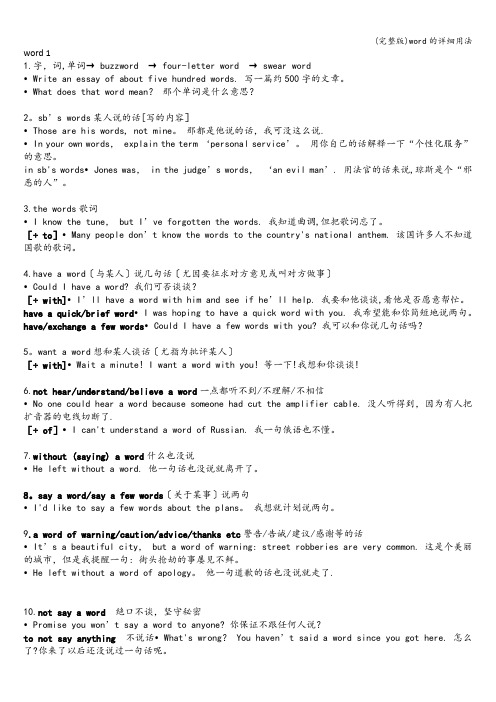
word 11.字,词,单词→ buzzword→ four-letter word → swear word•Write an essay of about five hundred words. 写一篇约500字的文章。
•What does that word mean?那个单词是什么意思?2。
sb’s words某人说的话[写的内容]•Those are his words, not mine。
那都是他说的话,我可没这么说.•In your own words,explain the term ‘personal service’。
用你自己的话解释一下“个性化服务”的意思。
in sb's words•Jones was, in t he judge’s words,‘an evil man’. 用法官的话来说,琼斯是个“邪恶的人”。
3.the words歌词•I know the tune,but I’ve forgotten the words. 我知道曲调,但把歌词忘了。
[+ to]•Many people don’t know the words to the country's national anthem. 该国许多人不知道国歌的歌词。
4.have a word〔与某人〕说几句话〔尤因要征求对方意见或叫对方做事〕•Could I have a word? 我们可否谈谈?[+ with]•I’ll have a word with him and see if he’ll help. 我要和他谈谈,看他是否愿意帮忙。
have a quick/brief word•I was hoping to have a quick word with you. 我希望能和你简短地说两句。
have/exchange a few words•Could I have a few words with you? 我可以和你说几句话吗?5。
words (易混单词)

注意事项
1.根据句子结构, 注意所填词的词性。 2.根据给出的汉语意思或首字母,注意辨析词义。 3注意词形—— 时态 、语态 、名词的单复数与所有格 、 非谓语动词形式 、主谓一致等 4 注意首字母的大小写。 5形容词、副词的原级 、比较级和最高级 6数词(基数词、序数词)。 7.注意高考词汇表中常见、常用、较长的单词及出现率 不高的(pink ;mirror ;bucket; biscuit;cushion……)
four / fourth /fourteen / forty /forties /fortieth
nine / h /ninety /nineties
twelve / twelfth ; explain / explanation finger /figure ; flour / floor/ flower ; goose/goods ; goat/goal affect/ effect/effort ; curtain/certain; fence/fierce ; lose /loose/ loss familiar/similar ; modern /modest; quantity/quality ; accent / accident stick / strike ; stuck / struck attack / attract ; country / county
success / succeed ; place / palace
breathe / breath
; include / conclude
charge / change /chance ; remind / remain
Pronounce /pronunciation ; follow / fellow
words

3. 一般来说, 水果和蔬菜的价格随季
节变化而变化。
Generally speaking, prices of fruit
and vegetables ______ varies ____ with the
season.
4. on guard: adj. 值班(警戒) 1.) While danger threatens we must all be on guard. 2.) There are soldiers on guard at the gate. 3.) Be on guard when somebody flatters you. 奉承 4.) The citizens were warned to be on guard against a sudden night attack.
8.) Giving advice at the right time has to involve a great deal of intelligence.
7. hold up: 举起 提出,支持住,阻挡 1). He held up his hand in amazement. 2) I decided to hold up on the news until I was sure of it. 暂缓发布
【语境展示】
1) People’s reactions to the drug vary
widely. 2) The samples varied in quality but were generally acceptable.
3) The colours of tree leaves vary with the season.
words

英国: [/ɪnˈteɡrəti/]1.integrity2.the quality of being honest and having strong moral principles 诚实正直3.the state of being whole and not divided 完整;完好英国: [/skɔː(r)/]1.score2.the number of points, goals, etc. scored by each player or team in a game or competition (游戏或比赛中的)得分,比分3.the number of points somebody gets for correct answers in a test (考试中的)分数,成绩4.a written or printed version of a piece of music showing what each instrument is to play or what each voice is to sing 总谱5.the music written for a film/movie or play (电影或戏剧的)配乐6.a set or group of 20 or approximately 20 20 个;约20 个7.very many 大量;很多8.a cut in a surface, made with a sharp tool 刻痕;划痕;伤痕9.the real facts about the present situation 实情;真相10.to win points, goals, etc. in a game or competition (在游戏或比赛中)得分11.to keep a record of the points, goals, etc. won in a game or competition (在游戏或比赛中)记分12.to gain marks in a test or an exam (在考试中)得分13.to give something/somebody a particular number of points 评分;打分数14.to be worth a particular number of points 分值是;得…分15.to succeed; to have an advantage 获得胜利;取得优势16.to arrange a piece of music for one or more musical instruments or for voices 编总谱(包括各种乐器及各声部的乐谱)17.to make a cut or mark on a surface (在物体表面)划下痕迹,刻出记号18.especially of a man 尤指男人to have sex with a new partner 和新伴侣发生性关系19.to buy or get illegal drugs 买(或搞到)毒品英国: [/sɔːt/]1.sort2.a group or type of people or things that are similar in a particular way 种类;类别;品种3.a particular type of person 某一种(或某一类)人4.the process of putting data in a particular order 分类;排序5.to arrange things in groups or in a particular order according to their type, etc.; to separate things of one type from others 整理;把…分类6.to deal with a problem or organize something/somebody in a satisfactory way 妥善处理;把…整理好(或安排妥当)英国: [/ˈkʌzn/]1.cousin2.a child of your aunt or uncle 同辈表亲(或堂亲);堂兄(或弟、姊、妹);表兄(或弟、姊、妹)3.a person who is in your wider family but who is not closely related to you 远房亲戚;远亲4.a way of describing people from another country who are similar in some way to people in your own country 兄弟的…国人民(对与本民族有某些类似的另一国家人民的说法)英国: [/ˈkɒmpəˈzɪʃn/]position2.the different parts which something is made of; the way in which the different parts are organized 成分构成;组合方式3.a piece of music or art, or a poem (音乐、艺术、诗歌的)作品4.the act of composing something 作曲;创作5.the art of writing music 作曲艺术6.a short text that is written as a school exercise; a short essay 作文;小论文7.the arrangement of people or objects in a painting or photograph (绘画、摄影的)构图英国: [/rɪˈteɪn/]1.retain2.to keep something; to continue to have something 保持;持有;保留;继续拥有3.to continue to hold or contain something 保持;继续容纳4.if a member of the public retains somebody such as a lawyer, he or she pays money regularly or in advance so the lawyer, etc. will do work for him or her 聘请(律师等)英国: [/ɪnˈstrʌktə(r)/]1.instructor2.a person whose job is to teach somebody a practical skill or sport 教练;导师3.a teacher below the rank of assistant professor at a college or university (大学)讲师英国: [/ˈdʒiː piːˈeɪ/]1.GPA2.the abbreviation for grade point average 各科成绩的平均积分点(全写为grade point average)英国: [/pɪə(r)/]1.peer2.a person who is the same age or who has the same social status as you 身分(或地位)相同的人;同龄人;同辈3.(in Britain) a member of the nobility (英国)贵族成员4.to look closely or carefully at something, especially when you cannot see it clearly 仔细看;端详英国: [/ˈliːniənt/]1.lenient2.not as strict as expected when punishing somebody or when making sure that rules are obeyed (惩罚或执法时)宽大的,宽容的,仁慈的英国: [/ˈkɒnstɪtjuːt/]1.constitute2.to be considered to be something (被认为或看作)是;被算作3.to be the parts that together form something 组成;构成4.to form a group legally or officially (合法或正式地)成立,设立英国: [/ˈpenəlti/]1.penalty2.a punishment for breaking a law, rule or contract 惩罚;处罚;刑罚3.a disadvantage suffered as a result of something 害处;不利4.in sports and games 体育运动an advantage given to a player or a team when the other side breaks a rule (对犯规者的)判罚,处罚5.in football 足球a chance to kick the ball into the goal without any defending players, except the goalkeeper, trying to stop it; the goal that is given if the kick is successful 点球;罚点球得分英国: [/ˈjuːnɪfaɪ/]1.unify2.to join people, things, parts of a country, etc. together so that they form a single unit 统一;使成一体;使一元化英国: [/kəʊˈhɪərənt/]1.coherent2.of ideas, thoughts, arguments, etc. 看法、思想、论点等logical and well organized; easy to understand and clear 合乎逻辑的;有条理的;清楚易懂的3.of a person 人able to talk and express yourself clearly 有表达能力的;能把自己的意思说清楚的英国: [/ˈɒstrəsɪzəm/]1.ostracism2.the act of deliberately not including somebody in a group or activity; the state of not being included 排挤;排斥英国: [/ɪnˈsɪdiəs/]1.insidious2.spreading gradually or without being noticed, but causing serious harm 潜伏的;隐袭的;隐伏的英国: [/ɪnˈvɪzəbl/]1.invisible2.that cannot be seen 看不见的;隐形的3.connected with a service that a country provides, such as banking or tourism, rather than goods 无形的(指银行、旅游等服务)cult [kʌlt]n. 礼拜;祭仪(尤其指宗教上的);狂热信徒adj. 狂热崇拜的verbatim [və:'beitim]adv. 逐字地adj. 逐字的英国: [/lɒɡ/]1.log2.a thick piece of wood that is cut from or has fallen from a tree 原木3.an official record of events during a particular period of time, especially a journey on a ship or plane (某时期事件的)正式记录,日志;(尤指)航海日志,飞行日志4.to put information in an official record or write a record of events 把…载入正式记录;记录5.to travel a particular distance or for a particular length of time 行驶,行进(若干距离或时间)6.to cut down trees in a forest for their wood 采伐(森林的)树木;伐木英国: [/ˈnævɪɡeɪt/]1.navigate2.to find your position or the position of your ship, plane, car etc. and the direction you need to go in, for example by using a map 导航;确定(船、飞机、汽车等)的位置和方向3.to sail along, over or through a sea, river etc. 航行;航海;横渡4.to find the right way to deal with a difficult or complicated situation 找到正确方法(对付困难复杂的情况)英国: [/rʌf/]1.rough2.having a surface that is not even or regular 粗糙的;不平滑的;高低不平的3.not exact; not including all details 不确切的;粗略的;大致的4.not gentle or careful; violent 粗暴的;粗野的;猛烈的5.where there is a lot of violence or crime 犯罪盛行的;充斥暴力的;危险的6.having large and dangerous waves 汹涌的;风浪很大的7.wild and with storms 恶劣的;有暴风雨的8.difficult and unpleasant 艰难的;讨厌的;令人不快的9.not feeling well 不舒服的;不适的10.simply made and not finished in every detail; plain or basic 粗糙的;不够精细的;朴实简单的11.harsh and unpleasant to taste, listen to, etc. 味道差的;刺耳的;令人难受的英国: [/dʒɪmˈnæstɪks/]1.gymnastics2.physical exercises that develop and show the body's strength and ability to move and bend easily, often done as a sport in competitions 体操;体操训练英国: [/ˈædʒʌŋkt/]1.adjunct2.an adverb or a phrase that adds meaning to the verb in a sentence or part of a sentence 附加语;修饰成分3.a thing that is added or attached to something larger or more important 附属物;附件英国: [/bɪˈliːɡəd/]1.beleaguered2.experiencing a lot of criticism and difficulties 饱受批评的;处于困境的3.surrounded by an enemy 受到围困(或围攻)的。
英语word的中文是什么意思
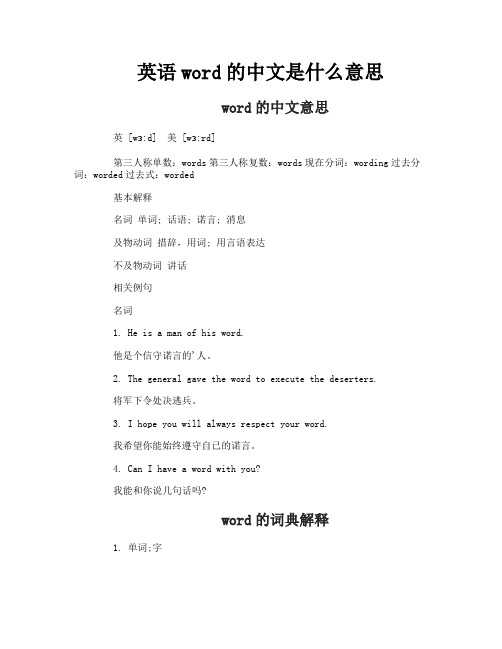
英语word的中文是什么意思word的中文意思英 [wɜ:d] 美 [wɜ:rd]第三人称单数:words第三人称复数:words现在分词:wording过去分词:worded过去式:worded基本解释名词单词; 话语; 诺言; 消息及物动词措辞,用词; 用言语表达不及物动词讲话相关例句名词1. He is a man of his word.他是个信守诺言的'人。
2. The general gave the word to execute the deserters.将军下令处决逃兵。
3. I hope you will always respect your word.我希望你能始终遵守自已的诺言。
4. Can I have a word with you?我能和你说几句话吗?word的词典解释1. 单词;字A word is a single unit of language that can be represented in writing or speech. In English, a word has a space on either side of it when it is written.e.g. The words stood out clearly on the page...那些字赫然写在纸上。
e.g. The word 'ginseng' comes from the Chinese word 'ren-shen'.ginseng 这个词来自汉语的“人参”。
2. 话;话语;所写的文字Someone's words are what they say or write.e.g. I was devastated when her words came true...她的话应验了,我伤心欲绝。
e.g. The words of the young woman doctor echoed in his ears...那位年轻女医生的话在他耳畔回响。
words
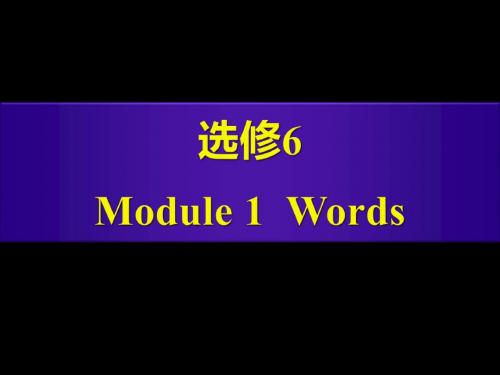
lack 3. v. 缺乏;缺少 advance adj. 预先的;在前的 4. opportunity 5. n. 机会 favour 6. n. 恩惠;照顾
7. reply n. 回答;答复;回信
8.shortcoming 9.
4. 她把表往前拨了10分钟。 She advanced the second hand ten minutes.
5. 我无法想象他单独一人住在那里。 I can’t imagine him living there alone. 6. 请让孩子们为会谈做好准备。 Please prepare the children for the conversation.
⑥look over仔细察看
⑦look up查找
9.leave out省去,遗漏,不考虑
①leave for...动身去…… ②leave sb. alone不打扰某人 ③leave sth. alone 别管某事 ④leave sth./sb.behind忘了带 某物;将某人抛在后面或落 下
next time, last time, every time, any time …
①___________I hear that song I feel Every time
happy. 我每次听到那首歌都感到很愉快。
② ___________ I went to China,I Last time
3.certain adj. 确凿的;无疑的;
It is certain that... for certain/sure确凿地;肯定地 It’s almost _______ that he will lose the next election. A.certain B.sure C.confident D.right 【答案】A
word的同义词

word的同义词word表单词; 话语; 诺言的意思,那么你知道word的同义词有哪些吗?接下来小编为大家整理了word的同义词,希望对你有帮助哦!word的同义词辨析:word, vocabulary, language, term, lexicon这些名词均有"文字,词,语言"之意。
word :普通用词,指语言的最小单位的单词、字,也可指话、整句话或一段话。
vocabulary :集合名词,指词汇、语汇或词汇量。
language :普通用词,指国家、民族或种族内部使用,已经系统化的语言。
term :指有特定意义的词,词语或术语。
lexicon :指某种语言、某人或某一知识领域的全部词汇。
词组习语:be as good as one's word1. 信守诺言have a word1. 简短地和某人说话我只想和他说一两句话。
I'll just &B{have a word with} him.have a word in someone's ear1. 和某人咬耳朵;和某人私下谈;私下警告某人in other words1. 换句话说,也就是说keep one's word1. 守信,遵守诺言a man/woman of his/her word1. 守信的人,遵守诺言的人(on/upon) my word1. 我敢保证;说实在话(表示惊讶或强调)说真的,你到这儿真快!。
my word, you were here quickly!.put something into words1. 用言语表达他感到些许无法用言语表达的失望之情。
he felt a vague disappointment which he couldn't put into words.put words into someone's mouth1. 硬说某人说过某些话take someone at their word1. 相信某人说的话是真的take the words out of someone's mouth1. 先说出某人想讲的话take someone's word (for it)1. 轻信某人的话too —— for words1. (非正式)很,极绕着路走上一圈真是乏味。
《words单词》课件

《Words单词》PPT 课件
REPORTING
目录
• 单词的起源和历史 • 单词的构成和分类 • 单词的发音和拼写 • 单词的用法和语境 • 学习单词的方法和技巧
PART 01
单词的起源和历史
单词的起源
单词的起源可以追溯到古代人类社会的语言交流,最初是简 单的声音和手势,随着人类文明的发展,逐渐形成了复杂的 语言系统。
制作闪卡
使用卡片来记录新学的单词,一面写英文,另一面写中文 ,随时随地复习。
学习计划和时间管理
01
02
03
04
制定学习计划
设定一个明确的学习目标,并 规划每天或每周的学习时间。
合理分配时间
将学习时间分散在一天的不同 时段,避免过度疲劳。
优先学习重要词汇
根据学习目标和需求,优先学 习最常用的词汇。
保持则
音标
音标是用来表示单词发音的符号系统,每个音标代表一个音素。
发音规则
英语中存在一些发音规则,如连读、弱读、失去爆破等,掌握这些规则有助于更自然地发音。
拼写规则和技巧
拼写规则
英语中存在一些拼写规则,如元音字母的发音、辅音字母的发音等,掌握这些规则有助于更准确地拼 写单词。
持续学习和探索
不断学习和探索新的词汇,保 持对语言的好奇心和求知欲。
即使在忙碌的时候,也要确保 每天都能抽出一些时间来学习
新单词。
学习资源和方法的选择
选择适合的学习资源
选择适合自己水平的单词书、 软件或在线课程。
多种方法结合
使用多种方法来学习新单词, 如听、说、读、写,以及使用 图像和视频等多媒体资源。
参与语言交流活动
words
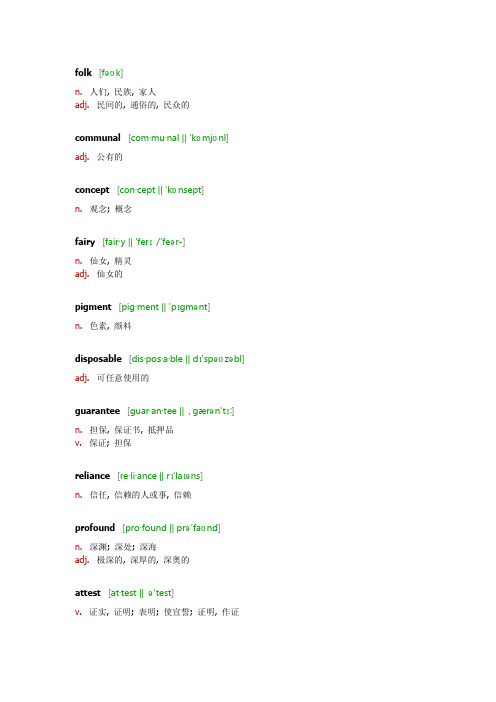
folk[fəʊk]n.人们, 民族, 家人adj.民间的, 通俗的, 民众的communal[com·mu·nal || 'kɒmjʊnl] adj.公有的concept[con·cept || 'kɒnsept]n.观念; 概念fairy[fair·y || 'ferɪ/'feər-]n.仙女, 精灵adj.仙女的pigment[pig·ment || 'pɪgmənt]n.色素, 颜料disposable[dis·pos·a·ble || dɪ'spəʊzəbl] adj.可任意使用的guarantee[guar·an·tee || ‚gærən'tɪː] n.担保, 保证书, 抵押品v.保证; 担保reliance[re·li·ance || rɪ'laɪəns]n.信任, 信赖的人或事, 信赖profound[pro·found || prə'faʊnd]n.深渊; 深处; 深海adj.极深的, 深厚的, 深奥的attest[at·test || ə'test]v.证实, 证明; 表明; 使宣誓; 证明, 作证zigzag[zig·zag || 'zɪgzæg]n. Z字形, 蜿蜒曲折, 锯齿形adj.曲折的, Z字形的, 锯齿形的adv.曲折地, 成锯齿形地optimistic[op·ti·mis·tic || 'ɑptɪmɪstɪk /'ɒp-] adj.乐观的criterion[cri·te·ri·on || kraɪ'tɪərɪən]n.标准; 规范; 准据abstainv.戒; 避开; 自制, 弃权obtain[ob·tain || əb'teɪn]v.得到, 获得; 得到公认; 流行; 通用; 存在quartet[quar·tet || kwɔr'tet /kwɔː'tet]n.四重奏; 四重奏乐团; 四重唱; 四重唱演出组acousticaladj.听觉的; 音响的; 声学的alligator[al·li·ga·tor || 'ælɪgeɪtə]n.产于美洲的鳄鱼, 短吻鳄longevity[lon·gev·i·ty || lɑn'dʒevətɪ/lɒn-] n.长命, 长寿; 寿命assignment[as'sign·ment || -mənt]n.功课, 作业; 工作; 分配instruction[in'struc·tion || ɪn'strʌkʃn]n.指示; 教育; 用法说明utensil[u·ten·sil || juː'tensl]n.器具evaporation[e·vap·o·ra·tion || ɪ‚væpə'reɪʃn]n.蒸发; 消失; 发散penetrate[pen·e·trate || 'penɪtreɪt]v.穿透, 看穿, 渗透; 刺入, 渗透, 看穿mere[mɪr /mɪə]n.浅湖; 池adj.仅仅的, 只不过的reproductive[,re·pro'duc·tive || ‚rɪːprə'dʌktɪv]adj.再生的; 复制的; 再现的; 生殖的curator[cu·ra·tor || ‚kjʊə'reɪtə]n.馆长; 评议员; 管理者; 监护人distinguish[dis·tin·guish || dɪ'stɪŋgwɪʃ]v.区别; 辨认出; 识别; 把...区别分类; 区别; 辨别; 识别vomit[vom·it || 'vɑmɪt /'vɒm-]n.呕吐, 催吐剂, 呕吐物v.呕吐, 大量喷出; 吐出, 呕吐abrasion[ab·ra·sion || ə'breɪʒn]n.磨耗; 磨蚀; 磨损之处puffed uppuffed up / ,pʌft `ʌp / adjective1 behaving as though you are especially good in some way, and people should admire youpiss off走开, 离开; 使生气blurt[blɜːt]v.冲口说出; 不经意说出prime[praɪm]n.最初, 初期; 春天; 黎明; 青年v.灌注, 装填; 使起动; 为...装火药; 在...上涂底漆; 作准备adj.最初的; 基本的; 原始的; 原有的dedicate[ded·i·cate || 'dedɪkeɪt]v.献; 题献; 致力enormouslyadv.巨大地, 庞大地tie[taɪ]n.领带; 联系; 绳索, 带子; 关系v.系, 扎, 打结; 被系住; 打成平手; 打结debug[de·bug || ‚diː'bʌg]v.除错; 除去窃听器; 改正有毛病部分(计算机用语)proactive['prəʊ'æktɪv]adj.前摄的savant[sa·vant || sæ'vɑnt /'sævənt]n.学者, 专家, 博学者scintillation[scin·til·la·tion || ‚sɪntɪ'leɪʃn]n.火花的闪烁; 才气焕发; 星光的闪耀scintillatingscin·til·lat·ing / `sɪntl,eɪtɪŋ / adjectivevery impressive, interesting, or clever:a scintillating conversation/performanceelaboration[e·lab·o·ra·tion || ɪ‚læbə'reɪʃn] n.精心制作; 精心之作; 精巧; 详细阐述paradox[par·a·dox || 'pærədɑks /-dɒks]n.似非而是的论点, 自相矛盾的话; 逆说, 悖论tragedy[trag·e·dy || 'trædʒɪdɪ]n.悲剧, 悲惨, 惨案intuitive[in·tu·i·tive || ɪn'tuːɪtɪv /-'tju-]adj.直觉的edifice[ed·i·fice || 'edɪfɪs]n.大厦; 大建筑物vestige[ves·tige || 'vestɪdʒ]n.遗迹, 残余, 痕迹utter[ut·ter || 'ʌtə(r)]v.发出; 发表; 做声adj.全然的, 完全, 绝对ludicrous[lu·di·crous || 'luːdɪkrəs]adj.可笑的, 荒唐的, 滑稽的raunchy[raunch·y || 'rɔːntʃɪ]adj.不整洁的; 淫荡的; 不修边幅的; 猥亵的hilarious[hi·lar·i·ous || hɪ'lerɪəs /-'leər-]adj.喜不自禁的, 愉快的, 欢闹的epilogue[ep·i·logue || 'epɪlɒg]n.结语; 收场白; 尾声haywiren.捆干草用的铁丝adj.混乱的; 疯狂的innate[in·nate || ɪ'neɪt]adj.先天的; 天生的malarial[ma'lar·i·al || mə'lerɪəl /-leər-]adj.疟疾的; 瘴气的obsidian[əb'sɪdɪən]n.黑曜石archaeologicaladj.考古学的necessitate[ne·ces·si·tate || nɪ'sesɪteɪt]v.使成为必需, 需要; 迫使prosperity[pros·per·i·ty || prɑ'sperətɪ/prɒ-]n.繁荣, 成功, 幸运the situation of being successful and having a lot of money:a time of national prosperitybuffer[buf·fer || 'bʌfə]n.缓冲存储器; 分隔, 划分; 记忆里被指定为暂时存储的位置(计算机用语); 减震器; 起缓冲作用的人drasticallyadv.大大地; 激烈地; 彻底地obligate[ob·li·gate || 'ɑblɪgeɪt/ ɒblɪgeɪt]v.使负义务, 预留, 强制disoblige[dis·o·blige || ‚dɪsə'blaɪdʒ]v.失望I'm sorry to disoblige you.我很抱歉不能答应你的请求。
words

adj. 同时的;联立的;同时发生的
n. 同时译员
95, inhibit [ɪn'hɪbɪt]
vt. 抑制;禁止
96, pertinent
97, coordinate [ko'ɔrdɪnet]
n. 坐标;同等的人或物
86, monarchy ['mɒnəkɪ]
n. 君主政体;君主国;君主政治
87, manifest ['mænɪfest]
vt. 证明,表明;显示
vi. 显示,出现
n. 载货单,货单;旅客名单
adj. 显然的,明显的;明白的
88, plausible ['plɔːzɪb(ə)l]
vt. 促进;帮助;使容易
38, alternative [ɔ:l'tə:nətiv]
adj. 供选择的;选择性的;交替的
n. 二中择一;供替代的选择
39, magnitude
40, illustrate ['ɪləstreɪt]
vt. 阐明,举例说明;图解
vi. 举例
vt. 成为……的基础;位于……之下
80, deficient [dɪ'fɪʃ(ə)nt]
adj. 不足的;有缺陷的;不充分的
81, inadequate [ɪn'ædɪkwət]
adj. 不充分的,不适当的
82, landlord ['læn(d)lɔːd]
n. 房东,老板;地主
51, fuel [fjʊəl]
n. 燃料;刺激因素
words
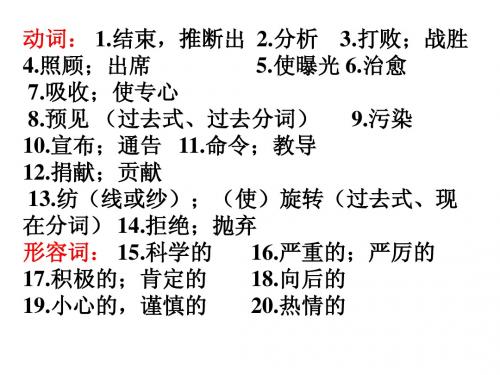
instruct vt. 指导,指示,命令 搭配与拓展: instruct sb. to do sth. 指示某人做某事 instruct sb. in sth. 在某方面指导某人 instruction n. 指导 ;(pl.)说明书 instructor 辅导员,讲师 instructive adj. 说明性的,指示性的,有教育意义的 The doctor instructed me to stay in bed. 1). ______________________________________ 医生吩咐我卧床休息。 2). The old workers instruct not only in words but _______________________ us deeds.那些老工人对我们不仅言传而且身教。 were also instructed not to 3).The water companies _____________________ expose people to polluted water anymore. 自来水公司也接到指令,不能再让人们接触到污染的水。
TБайду номын сангаасose _____________________bird flu who were exposed to were____________. separated 禽流感患者被隔离。 禽流感患者被隔离。
absorb vt. 吸收,吸引,聚精会神,使专心 合并 吸收,吸引,聚精会神,使专心,合并 搭配: 全神贯注于某事; 搭配:be absorbed in sth. / doing sth.全神贯注于某事; 全神贯注于某事 be absorbed into 被吸入(并入); 被吸入(并入); absorbs water 1).A sponge _______________.海绵吸水。 海绵吸水。 海绵吸水 2). These small companies ______________________________________ the big have been gradually absorbed into company. 这些小公司渐渐被那大公司吞并了。 这些小公司渐渐被那大公司吞并了。 is absorbed in 3).The writer _______________ his writing. 这位作家在全神贯注地写作。 这位作家在全神贯注地写作。
"Word"的18个意思:正式用法和非正式用法
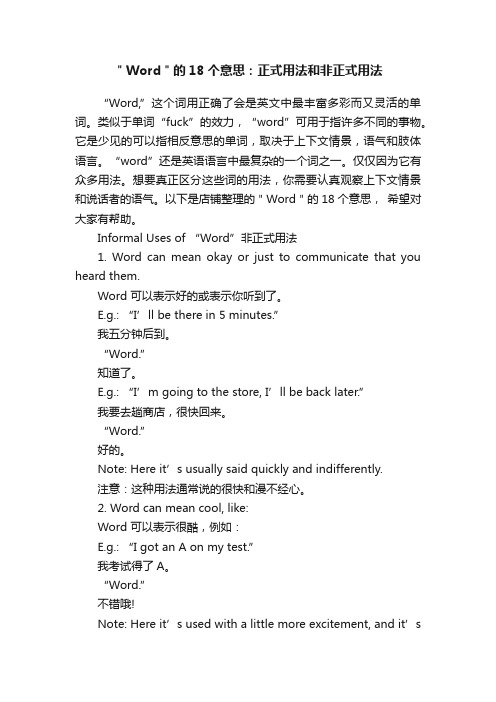
"Word"的18个意思:正式用法和非正式用法“Word,”这个词用正确了会是英文中最丰富多彩而又灵活的单词。
类似于单词“fuck”的效力,“word”可用于指许多不同的事物。
它是少见的可以指相反意思的单词,取决于上下文情景,语气和肢体语言。
“word”还是英语语言中最复杂的一个词之一。
仅仅因为它有众多用法。
想要真正区分这些词的用法,你需要认真观察上下文情景和说话者的语气。
以下是店铺整理的"Word"的18个意思,希望对大家有帮助。
Informal Uses of “Word”非正式用法1. Word can mean okay or just to communicate that you heard them.Word 可以表示好的或表示你听到了。
E.g.: “I’ll be there in 5 minutes.”我五分钟后到。
“Word.”知道了。
E.g.: “I’m going to the store, I’ll be back later.”我要去趟商店,很快回来。
“Word.”好的。
Note: Here it’s usually said quickly and indifferently.注意:这种用法通常说的很快和漫不经心。
2. Word can mean cool, like:Word 可以表示很酷,例如:E.g.: “I got an A on my test.”我考试得了A。
“Word.”不错哦!Note: Here it’s used with a little more excitement, and it’sa little more drawn out..注意:此处的word要说的带有一些激动,并稍微拉长一下语调。
3. Word can be used in an annoyed or indifferent way, like yeah, whatever:Word 可以用于表示被惹恼了或漫不经心,犹如“嗯,随便啦”的用法。
words
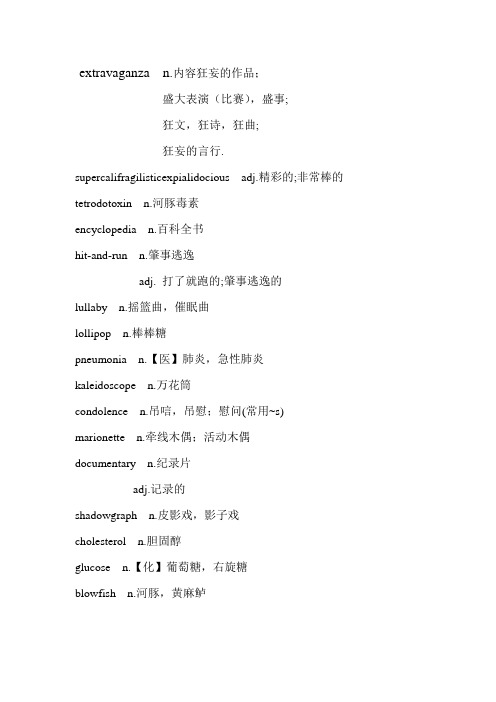
extravaganza n.内容狂妄的作品;
盛大表演(比赛),盛事;
狂文,狂诗,狂曲;
狂妄的言行. supercalifragilisticexpialidocious adj.精彩的;非常棒的tetrodotoxin n.河豚毒素
encyclopedia n.百科全书
hit-and-run n.肇事逃逸
adj. 打了就跑的;肇事逃逸的
lullaby n.摇篮曲,催眠曲
lollipop n.棒棒糖
pneumonia n.【医】肺炎,急性肺炎kaleidoscope n.万花筒
condolence n.吊唁,吊慰;慰问(常用~s) marionette n.牵线木偶;活动木偶
documentary n.纪录片
adj.记录的
shadowgraph n.皮影戏,影子戏
cholesterol n.胆固醇
glucose n.【化】葡萄糖,右旋糖
blowfish n.河豚,黄麻鲈
jellyfish n.水母;海蜇;
软弱无用的人;意志薄弱的人hamster n.<动> 仓鼠
cuckoo n.布谷鸟,杜鹃
adj.疯狂的,傻,笨
octopus n.章鱼
meek adj.温顺的;驯服的
Puerto Rica 波多黎各
Papua New Guinea 巴布新几内亚abyss n.深渊,无底洞;深邃;
<古>地狱;阴间;浑沌kowtow vi.叩头;顺从;惟命是从;
(对...)卑躬屈膝。
Words! Words! Words!译文

Words! Words! Words!词呀!多义的词!“It works.” These words may be the final judgment on a missile project or a plan to increase the efficiency of a labour group or could be the happy answer to the project that proved too complicated for father to assemble. They also may describe what goes on when the right mixture is put away in sealed bottles or jugs. Some earn their living at a boiler “works” and it is the “works” that make a watch tick. Most people work for a living, but what teenager hasn’t “worked” on his dad for the use of the car. And a boat will work its way through an ice field or an army through a swamp or heavy going.The physicist has a precise meaning for the word “work”, but the metallurgist uses the word in relation to a wide variety of processes. Cogging of ingots, rolling of bars or sheets, forging of bars, blocks, or semi-finished parts, piercing of bars to form tubing, drawing of wire through dies or the drawing of sheet into cups, swaging, hammering, extruding, all are operations involving the “working” of metals and produce parts that are classed as “worked” metals. “Work” to the metallurgist is any operation that changes the shape of a metal part without changing its volume. A nail bent by a hammer is “worked” and the straightening that follow s is further working. The making of an automobile fender, of a tube for toothpaste, or of an aluminum safety hat are common examples which involve severe working of metals. Of all parts made of metals, castings and sintered products are the only classes of final product which do not, at some stage or other in their manufacture, go through one or more operations which are classed as “working”.行了(It Works)。
word可数吗
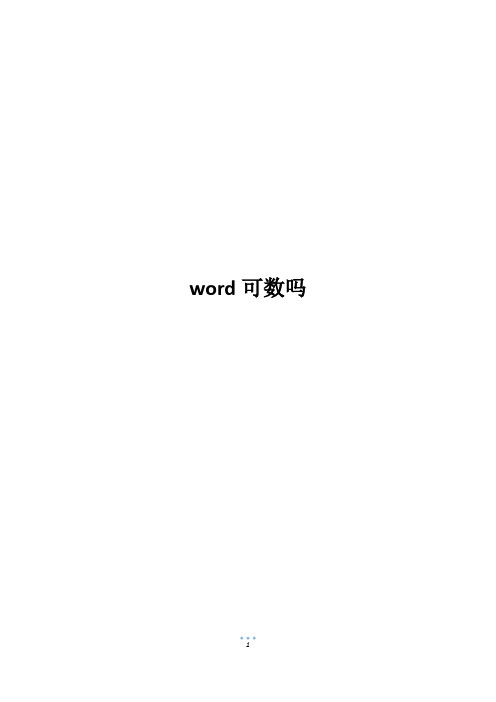
word可数吗word既是可数名词又是不可数名词。
word作为“一件作品”的意思时为可数,作“工作量”时为不可数。
word主要用作名词和动词,作名词译为“单词;话语;消息;诺言;命令”;作动词译为“用言辞表达”。
一、word词态变化第三人称单数:words复数:words现在分词:wording过去式:worded过去分词:worded二、word用法说明1.word的基本意思是“单词”,指语言中能独立存在的最小表意单位,也可指“(说的)话,话语,言语,谈话”等,是可数名词。
2.word也可作“消息,信息,谣言”“口令,号令,命令”等解,通常用作单数形式,作“消息,信息,谣言”解时,一般不与冠词连用,但作“口令,号令,命令”解时,可与定冠词the连用。
3.word还可作“诺言,保证”解,既可用作可数名词,也可用作不可数名词。
4.word还可指《圣经》,尤指“福音”,作此解时通常用作单数形式,并与定冠词the连用,首字母大写。
5.word用作动词的意思是“用词语表达”,也可作“选用”解。
6.word既可用作及物动词,也可用作不及物动词。
用作及物动词时,接名词或代词作宾语,可用于被动结构。
7.word的过去分词worded可用作形容词,在句中作定语。
三、word短语搭配in other word换句话说;也就是说in a word总之;简言之one word一个字;一句话last word最后一句话四、word双语例句1.Just say the word, and I'll go.只要发句话,我就走。
2.That's a word I never use.那是我从来不用的字眼。
3.I could hear every word they said.他们说的每句话我都能听见。
4.Word always gets out no matter how careful you are.无论你多么小心,总会有消息走漏。
- 1、下载文档前请自行甄别文档内容的完整性,平台不提供额外的编辑、内容补充、找答案等附加服务。
- 2、"仅部分预览"的文档,不可在线预览部分如存在完整性等问题,可反馈申请退款(可完整预览的文档不适用该条件!)。
- 3、如文档侵犯您的权益,请联系客服反馈,我们会尽快为您处理(人工客服工作时间:9:00-18:30)。
()31.--- he prefers the book ____he borrows from his best friend---- ___________A. /.B. who.C. when.D. where()32. Mum, my _______are too short. Will you buy me a new pair?A. trousersB. glassesC. clothesD. dress( ) 33. --- When do you go shopping?--- I usually go shopping _________ Sunday mornings.A. onB. inC. atD. for( ) 34. Hangzhou is a nice city. My dad ________ me there when I was about ten years old.A. pulledB. caughtC. tookD. brought( ) 35. --- Hi, Mike! How is it going?--- ___________.A. Good idea.B. I think soC. Pretty goodD. Of course( ) 36 .____________ weather it is!A. What a fineB. How fineC. What fineD. How fine the ( ) 37. David comes from _________ European country and he is __________ honest boy.A. an; aB. a; anC. the; anD. a; the( ) 38. —Can the little girl read﹖—Yes.She can read an story.A.500 words B.800 word C.800-word D.500-words'( ) 39. There is going to ________ a football game on TV this evening.A. haveB. holdC. beD. has( ) 40. ―Trick or Treat‖ is a popular game for children o n _________.A. HalloweenB. EasterC. Thanksgiving DayD. New Year’s Day( ) 41. Betty arrived __________ London _________ the evening of Jane 1st.A. at; inB. at; onC. in; inD. in; on( ) 42. --- How do you like the TV play?---___________________.A. It’s wonderful.B. What about you?C. Yes, I like it.D. No, I don’t like it at all.( ) 43. ---I hear you have got a ticket ____ the Opening Ceremony of the Beijing Olympics.---Yes, I got it ________ my uncle.A. of; fromB. to; fromC. to; byD. for; to( ) 44. --- Must I wait for you here now?--- No, you _______. You may be back in half an hour.A. don’t have toB. mustn’tC. can’tD. shouldn’t( ) 45. ---________ enjoyable it is to travel by air!--- _____________________.A. How; So is itB. How; So it isC. What; So is itD. What; So it is( ) 46. His grandfather since two years ago.A.died B.has died C.has dead D.has been dead( ) 47. Kate met a lot of problems she was going over her lessons.A.before B.as soon as C.until D.while( ) 48. --- What did the English teacher talk to you last Friday?--- She told me to ________ my lessons carefully before the exam.A. look upB. go overC. look afterD. go on( ) 49. Li Lei ran than Lin Tao.A.much slow B.very more slowlyC.much more slowly D.very slowly. ( ) 50。
--- Would you mind opening the window?--- _______.A. Of course not. Do please.B. Ok. Do as you like.C. That’s all right.D. Yes, please.1、People like to visit England, because it is too hot too cold.A、neither; norB、either; orC、both; andD、not; but2、China a lot in the ten years.A、changed; pastB、was changed; firstC、has changed; lastD、has changed; next3、makes perfect.A、PracticeB、PracticingC、PracticesD、To practice4、—How does your father make money?—.A、Listen to the recorderB、Sell fruitC、Sells fruitD、By selling fruit5、My friends and I are interested in drawing, but of us is good at it.A、neitherB、bothC、noneD、all6、This story along time ago.A、was happenedB、has happenedC、happenedD、happen7、—Must I come to see you again?—No, you .A、mustn’tB、need n’tC、can’tD、may not8、A proverb says, ―It is less of a problem to be poor than dishonest.‖A、beingB、beC、to beD、/9、Young trees should be .A、taken good careB、take good care ofC、looking after wellD、well looked after10、He went to the teacher for .A、some advicesB、some adviceC、some piece of advice11、The new type of car is going to in three years.A、turn outB、be turned outC、has turned outD、have been turned out12、He was asleep his arms on his head.A、useB、forC、withD、under13、She has to ask for leave.A、two dayB、two daysC、two day’sD、two days’14、The Great Green Wall stop the from the earth away.A、sand; movingB、sand; blowC、wind; moveD、wind; blowing15、Please stay here. It’s raining outside.A、hardB、hardlyC、heavyD、strong16、Mother always tell me―careful when crossing the street.‖A、You areB、AreC、BeD、To be17、I think Tony at school.A、beB、maybeC、may beD、be18、I want a cat, but my mother won’t let me have.A、itB、oneC、anotherD、the other19、Without electricity human life quite difficult today.A、isB、will beC、would have beenD、would be20、Who asked you the black board?A、to cleanB、cleanC、cleanedD、cleaning1.Mary is from France. She studies English by _____ English movies.A. watchB. to watchC. watchesD. watching2.If you practice ____ English every morning, you will improve it quickly.A. to readB. readingC. readD. be reading3.It’s Sunday today. What about ____ the mountains?A. to climbB. climbC. climbingD. climbed4.Tom decided ____ in China.A. travelB. travelingC. to travelD. traveled5.Do you enjoy ____ on the Internet?A. surfingB. surfC. to surfD. surfed6.—Do you have any ___ making a sentence with ―science‖? ----Not at all.A. practiceB. troubleC. worryD. help7.Do you find this book ____?A. frustrateB. frustratingC. frustratedD. frustration8.Can you tell me the best way ____ the problem?A. solveB. solvedC. to solveD. solving9.I couldn’t ____ these new words because I had no dictionary.A. look upB. look forC. look afterD. look like10.When we practice speaking English ,we often end up ___ in Chinese.A. speakB. speakingC. spokenD. speaks11. I learn French ____ keeping a French notebook.A. byB. forC. in D at12.Many students asked the teacher ___ the time of the test.A. forB. aboutC. toD. of13.Did you see them ____ basketball this morning?A. playingB. playedC. to playD. are playing14.Sam can’t pronounce the word. I can’t,____.A. tooB. eitherC. alsoD. neither15.Peter got ____ when she heard the good news.A. angryB. excitedC. excitingD. sad16.Mary has ____ friends to play games____.A. no, withB. no, inC. not, withD. no, on18.When I have problems I often ask my father ____.A. to helpingB. helpC. for helpD. to help19.---I don’t know _____ to play the piano?----My cousin can teach you.A. whoB. whatC. how D when20.---Sorry sir, I broke your cup.----_____ are you going to deal with the broken cup?A. WhereB. HowC. WhatD. When21.Small children ____ to go out at night.A. afraid ofB. are afraidC. is afraid ofD. are afraid22.As a student, it is your ____ to study hard.A. dutyB. mistakesC. notesD. challenge23.In 2001 China _____ the WTO and became a new member of it.A. took part inB. attendedC. joinedD. joined in24.We can’t do well in examinations ____ we study hard in school time.A. ifB. andC. sinceD. unless25.If you want to study English well, please read aloud every morning. It helps _____.A. a lot ofB. lot ofC. a littleD. a little of26.He is good at maths. He made___in the test. So his teacher is very pleased.A. few mistakesB. little mistakeC. a few mistakesD. a little mistake27.He can’t ____ English, but he can ____ it in Japanese.A. speak, speakB. say, speakC. speak, sayD. speak, talk28.---Do you mind____? ------Of course not.A. my turning on the TVB. I turning on the TVC. Me to turn on the TVD. me turn on the TV29.Ten years , his hometown changed a lot.A. goes byB. went byC. has goneD. passed by30. ―Who called me just now?‖―I don’t know, but it was a girl’s___.‖A. soundB. voiceC. noiseD. singing31.If you don’t know how to pronounce new words, ___in a dictionary, please.A. look upB. look it upC. look them upD. look up them32.After hearing her words, my teacher was ______ .A. impressedB. impressingC. to impressD. impresses()21. --_____ do you study for a test?--_____ reading the textbook.A. What; OnB. How; ByC. What; ByD. How, on()22. I don't know _____ this problem. It's too hard.A. which to doB. how to deal withC. what to dealD. How deal with ()23. Are you afraid of _____ alone?A. sleepB. to sleepC. sleepingD.slept()24. I _____ half an hour doing my homework yesterday.A. spentB. paid forC. tookD.cost()25. People under 21 are not ____ in the USA.A. allow drinkingB. allowed to drinkC. allow to drinkingD.allowing to drink()26. Tom doesn't like eggs now but he ______ them.A. used to likeB. use to likeC. used not likeD. is used to like()27. Boys are always _____ about playing football.A. excitingB. excitedC. to excitingD. to excited()28. There must ______ something wrong with my new watch.A.haveB.is D.be D. are()29. —Where are Lucy and Lily?—Oh , the two girls_must _______ a game in the garden now.A. playB. are playingC. playedD. be playing()30. —What about this green coat, Madam?—It_______ nice . I'll take it.A. smellsB. soundsC. looksD.tastes()31. If I _____ you, I would go and see the doctor at once.A. amB. are D. were D. was()32. ---Go and ask Mr. Green for help. ---But I don’t know _____.A. where does he liveB. where he livesC. where is he living()33. -- Listen! Tony is singing in the next room.-- It ________ be Tony. He has gone to Beijing.A. can’tB. mustC. mustn'tD.needn’t()34. —This sweater is too expensive. I can’t afford it.— How about this o ne? It’s much ______.A. cheapB. cheaperC. cheapestD. more cheap()35. Tom is an ________ boy.A..t en-year-oldB. ten-years-oldC. eight years oldD. eight-year-old 21.Schools allow students at least one hour a day for sports.A.would B.might C.should D.could22. –You didn’t send me an e-mail last night, did you?–Sorry. My broke down. I couldn’t get online.A.computer B.car C.clock D.camera23.– Look! Here comes our school bus.–No hurry. Don’t get on it it has stopped.A.when B.after C.since D.until24 .– I called you at half past nine this morning, but there was no answer.– Oh, sorry, I with my cousin in the supermarket.A.shop B.was shopping C.shopped D.will shop 25.That's very kind you. I know it's very hard you to do that.A.of, of B.of, for C.for, of D.for, for26.If you are feeling , you’d better share your problems with your friends or family members.A.excited B.tired C.stressed D.relaxed27.– Will you come to the dinner party? –I won’t come unless Jenny .A.invited B.is invited C.can be invited D.will be invited 28.There was so much noise in the room we couldn't hear him clearly.A.what B.because C.but D.that29.This is the first thing you are after you get there.A.suppose to do B.supposed do C.supposed to do D.supposed doing 30.There some old and low houses in the village.A.used to be B.were used to be C.uses to be D.used to be having 31.The students have read books.A.two hundreds B.hundred ofC.two hundred of D.hundreds of32.– How was your visit to Tibet? –. The scenery is amazing!A.It was wonderful l B.It was hard to sayC.I didn’t enjoy it D.It was unpleasant33.More and more people in Beijing are learning English they can better serve the 2008 Olympic Games.A.because of B.so that C.even though D.as if34.The film is very and all the audience were by it.A.moving, moved B.moved, movingC.moving, moving D.moved, moved35.– Would you like some more rice? – No, thanks. .A.Just a little B.It doesn’t matterC.I’ve had enough D.I’d love to( )1.--How do you study _______a test? --I study _______reading the textbook.A. for ; forB. for ; byC. by ; for D .by ; by( )2. I don't know _______.Can you tell me________?A. how swim; what to doB. how to swim ; what to do itC. how to swim; what to doD. what to swim; how to do( )3. Liu Xiang is one of ______ runners in the world.A. famousB. more famousC. the most famous( )4. My brother spends too much time ______computer games.A. to playB. playC. playsD. playing( ) 5. If I ____ ten million dollars, I ____travel around the world.A. have; willB. had; willC. had; will D .had; would( )6.The young trees should ______well as often as possibleA.be waterB. wateredC. wateringD. be watered( )7.He pretended ________me when he walked by.A. not seeB. not to seeC. don't seeD. to not see( )8._________that river ________very clean?A. Did ;use toB. Did ;use to beC. Does ;used toD. Does ;use to be( )9.You__________to school so early. It opens at 7.A. needn't comeB. don't need comeC. needn't comingD. needn't to come( )10.----How many people will come to Beijing next year?----It's hard to say. _________people , I think.A. Million ofB. Millions ofC. Three millionsD. Three millions of( )11.-----Whose guitar is this?-----Susan plays the guitar. It must _______.A. belong to herB. belong herC. belong to hersD. belong hers( )12.Do you like music ____makes you excited?A. thatB. whatC. whoD. it( )13.We prefer ________at the party rather than______.A. to sing; danceB. to sing ; dancingC. sing; to danceD. sing ;dance( )14.------Where would you like to visit?------ I'd like to visit____A. warm somewhereB. warm anywhereC. somewhere warmD. anywhere warm( )15.I like places __________it's not cold in winter.A. thoseB. whichC. whereD. this70.Students are not _________ to be late for class.71. I study English by________ to tapes.72. There must _______ some students in the classroom.73. If it ___________ tomorrow, I’ll have to stay at home.74. A boy ________ Jim is waiting for you outside.B) 根据句意及词首字母提示,补全单词。
